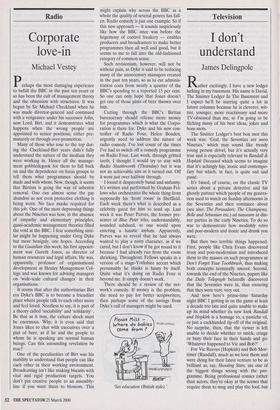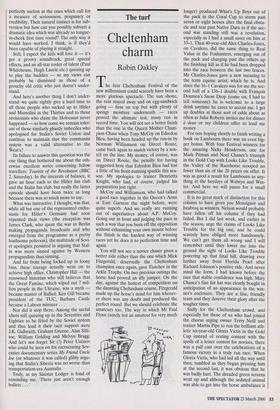Television
I don't understand
James Delmgpole
Rather excitingly, I have a new lodger lurking in my basement. His name is David, The Sinister Lodger In The Basement and I expect he'll be starring quite a lot in future columns because he is cleverer, wit- tier, younger, more reactionary and more TV-obsessed than me, so I'm going to be filching many of his best ideas, jokes and bons mots.
The Sinister Lodger's best bon mot this week was: 'God, the Seventies are s000 Nineties,' which may sound like trendy young person drivel, but it's actually very true and is especially relevant to Randall & Hopkirk Deceased which seems to imagine that it's achingly hip, ironic and contempo- fary but which, in fact, is quite sad and passé.
It's based, of course, on the classic TV series about a private detective and his ghostly partner which people of my genera- tion used to watch on Sunday afternoons in the Seventies and then reminisce about (see also: The Persuaders; The Champions, Belle and Sebastian etc.) ad nauseam at din- ner parties in the early Nineties. To do so was to demonstrate how modishly retro and post-modem and ironic and drunk you were.
But then two terrible things happened. First, people like Chris Evans discovered irony and post-modernism and introduced them to the masses on such programmes as Don't Forget Your Toothbrush, thus making both concepts terminally uncool. Second, towards the end of the Nineties, papers like the Daily Telegraph belatedly discovered that the Seventies were in, thus ensuring that they were very, very out.
And now here's prime-time Saturday night BBC 1 getting in on the game at least a decade too late and quite unable to make up its mind whether its new look Randall and Hopkirk is a homage to, a pastiche of, or just a cackhanded rip-off of the original. No surprise, then, that the viewer is left unable to decide whether to smirk, cringe or bury their face in their hands and go: 'Whatever happened to Vic and Bob?'
For Vic Reeves (Hopkirk) and Bob Mor- timer (Randall), much as we love them and were dying for their latest venture to be as brilliant as, say, Shooting Stars, are one of the biggest things wrong with the pro- gramme. Being professional comics rather than actors, they're okay at the scenes that require them to mug and play the fool, but perfectly useless at the ones which call for a measure of seriousness, poignancy or credibility. Their natural instinct is for sub- version but how can you possibly subvert a dramatic idea which was already so tongue- in-cheek first time round? The only way it would have worked, I think, is if they'd been capable of playing it straight.
Still, I expect the kids will love it — it's got a groovy soundtrack, great special effects, and an all-star roster of talent (Paul Whitehouse, Hugh Laurie etc.) queuing up to play the baddies — so my views can probably be dismissed as those of a grouchy old critic who just doesn't under- stand.
And here's another thing I don't under- stand: we quite rightly give a hard time to all those people who sucked up to Hitler and Mussolini in the Thirties and to those revisionists who claim the Holocaust never happened — so how come we remain toler- ant of those similarly ghastly imbeciles who apologised for Stalin's Soviet Union and continue to maintain that the communist system was a valid alternative to the West's?
Its failure to answer this question was the one thing that bothered me about the oth- erwise excellent series concerning fellow travellers: Tourists of the Revolution (BBC 2, Saturday). In the interests of balance, it gave an hour each to the Hitler fan club and the Stalin fan club, but really the latter episode should have been twice as long because there was so much more to say.
What was instructive, I thought, was that, while all but one of the represented enthu- siasts for Hitler's Germany had soon repented their views (the exception was James Clark, who spent the war in Berlin making propaganda broadcasts and who emerged from the programme as a pretty loathsome poltroon), the multitude of Sovi- et apologists persisted in arguing that Stal- in was more sinned against by Western propagandists than sinning.
And far from being locked up in loony bins, these toerags actually went on to achieve high office. Christopher Hill — the renowned historian who still believes that the Great Famine, which wiped out 7 mil- lion people in the Ukraine, was a myth — became master of Balliol; Ken Gill became president of the TUC; Barbara Castle became a Labour minister . . .
Nor did it stop there. Among the useful idiots still queuing up in the Seventies and Eighties to be feted by the Soviet system and thus lend it their tacit support were J.K. Galbraith, Graham Greene, Alan Silli- toe, William Golding and Melvyn Bragg. And let's not forget Sir (!) Peter Ustinov who could be seen on his excruciating Sev- enties documentary series My Friend Uncle Joe (or whatever it was called) glibly argu- ing that Stalin's Siberia was no worse than transportation-era Australia. Truly, as my Sinister Lodger is fond of reminding me, 'There just aren't enough bullets .



































































 Previous page
Previous page